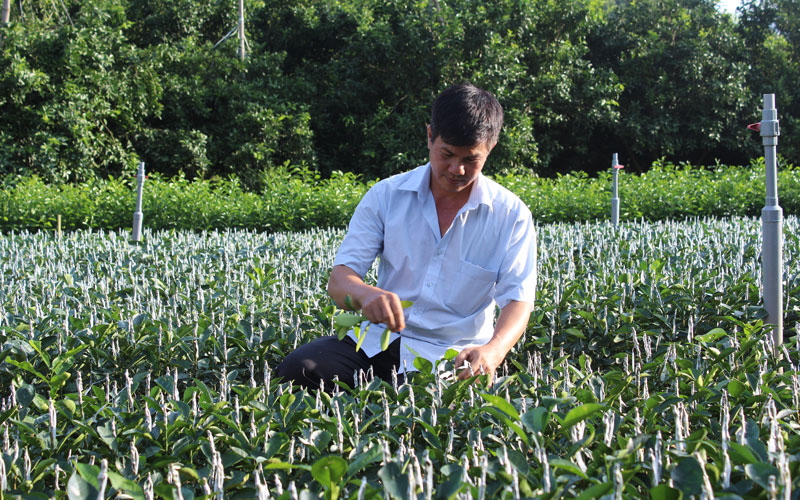
(HBO) – Being keen on gardening, Nguyen Van Thang, born in Hanoi’s outlying Ba Vi district in 1969, has been spending more than 20 years in Thung Rech, a rich soil area in Tu Son commune of Kim Boi district (Hoa Binh province). Between 1992 and 1997, he was known as "King of Sugarcane” in Thung Rech. He was the first to grow sugarcane in the area, leading to a mass cultivation that helped local people alleviate hunger and reduce poverty.

Nguyen Van Thang stands next to a grapefruit nursery.
Thang has changed the mind
of local residents when he first brought red sugarcane to Thung Rech.
At first, he planted
sugarcane on one hectare and then expanded the area to three hectares. Each
hectare brought him an average annual income of 30 million VND. At the time, red
sugarcane growing became a solution to hunger elimination and poverty reduction
in the area and Thang was called "King of Sugarcane”. However, in 1998, all
sugarcane plantation areas were ruined by fires, causing great economic losses.
In 2000, Thang began growing oranges, mainly Xa Doai orange varieties, on a
1.5-ha area. His orange garden could produce 70 tonnes at its peak.
To date, his family’s orchards
have been expanded to nearly five hectares, of which three hectares of oranges,
one hectare of lemons and grapefruits, and one hectare of longans. The orchards
rake in over 1 billion VND in revenue each year, with a disposable profit of
700 million VND.
Thanks to his creative
dynamism and willingness to restructure the crops, Thang has turned himself
into a millionaire in Thung Rech. He has also created stable jobs and incomes for
15 labourers.
Since late 2016 when Thang
joined Muong Dong Agriculture & Trade Cooperative, he has been encouraged
to follow a farming model that is suitable to the locality’s potential and
advantages.
To help the crops develop
well, Thang combined different types of fertilizers for the best results.
Oranges from his garden
are sweet and become a favorite among consumers. Thang revealed that preventing
diseases and using fertilizers are the most important tasks in growing oranges
and mandarins. He frequently examines the garden to prune tree branches and
promptly detect symptoms of diseases. Thang and other members of the Muong Dong
Agriculture & Trade Cooperative are now following a new cultivation method
that promotes the use of organic fertilizers to ensure food safety and protect the
environment.
Thang’s achievements are
admirable, reflecting the aspiration and perseverance of a man who dares to
leave the city to settle in a remote area and always strives to get rid of poverty.
According to data from the Hoa Binh Provincial Party Committee, the industrial production index for the first six months of 2025 is estimated to have increased by 20% compared to the same period last year. This marks the highest year-on-year growth rate for this period since 2020.
In the first six months of 2025, Hoa Binh province’s export turnover was estimated at 1.145 billion USD, marking an 18.11% increase compared to the same period in 2024. Import turnover was estimated at $ 804 million, a 17.15% increase, which helped the province maintain a positive trade balance.
The lives of the ethnic minority farmers in Tan Lac district have gradually improved thanks to the new directions in agricultural production. This is a testament to the collective strength fostered through the professional associations and groups implemented by various levels of the district’s Farmers’ Union.
With the motto the "product quality comes first,” after nearly one year of establishment and operation, Muong village’s Clean Food Agricultural and Commercial Cooperative, located in Cau Hamlet, Hung Son Commune (Kim Boi district), has launched reputable, high-quality agricultural products to the market that are well-received by consumers. The products such as Muong village’s pork sausage, salt-cured chicken, and salt-cured pork hocks have gradually carved out a place in the market and they are on the path to obtaining the OCOP certification.
In the past, the phrase "bumper harvest, rock-bottom prices" was a familiar refrain for Vietnamese farmers engaged in fragmented, small-scale agriculture. But today, a new spirit is emerging across rural areas of Hoa Binh province - one of collaboration, organisation, and collective economic models that provide a stable foundation for production.
Maintaining growing area codes and packing facility codes in accordance with regulations is a mandatory requirement for agricultural products to be eligible for export. Recently, the Department of Agriculture and Environment of Hoa Binh province has intensified technical supervision of designated farming areas and packing facilities to safeguard the "green passport" that enables its products to access international markets.



